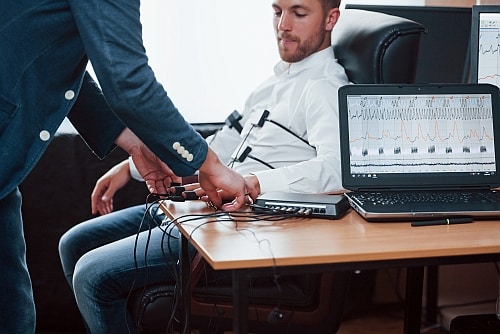While polygraph tests are commonly used in police investigations and screening processes, their accuracy and reliability are controversial. There is no scientific consensus on whether they can accurately detect deception.
Their results are inadmissible as evidence in most courts because of the lack of proven validity and accuracy. However, polygraph tests are still frequently used by law enforcement agencies and government entities during the initial stages of investigations and for screening purposes.
To learn more about these tests and if they can help your case, get in touch with Greenville polygraph testing experts.
What Is a Polygraph Test?
A polygraph test, commonly known as a lie detector test, is used to determine if someone is telling the truth or lying. It works by measuring certain physiological responses, like changes in breathing, heart rate, and perspiration. The idea is that lying causes anxiety, which leads to measurable physical reactions.
Polygraph tests typically involve attaching sensors to the person being tested to monitor these reactions. The most common types of polygraph tests are:
Control Question Test (CQT)
This asks irrelevant, control questions to establish a baseline for the person’s reactions, then compares those reactions to relevant questions about the specific issue being investigated. The assumption is that stronger reactions to relevant questions indicate deception.
Guilty Knowledge Test (GKT)
This tests a person’s familiarity with details of a crime or event that only someone involved would know. Strong physiological reactions to correct details suggest a person has “guilty knowledge” of the event.
Directed Lie Test (DLT)
This instructs the person to deliberately lie in response to some questions. Their reactions to those questions are compared with reactions to relevant questions from the actual investigation. The assumption is that it’s more difficult for people to lie effectively, so their reactions may differ.
When Are Polygraph Tests Admissible in Court
While polygraph tests are generally inadmissible in South Carolina courts, there are a few rare exceptions. According to the South Carolina Supreme Court, polygraph results may be admissible if both parties stipulate to the admissibility before the test is taken.
Both the prosecution and the defense must agree in writing that the results will be admissible. However, the Court has noted that even with a stipulation, the trial judge maintains discretion over whether to admit the polygraph results.
Another exception is if there is independent evidence that corroborates the polygraph results. For example, if a suspect confesses to a crime and then takes a polygraph test confirming the confession, the court may admit the polygraph results to support the credibility of the confession. The key is that there must be independent evidence of the suspect’s guilt before the polygraph results become admissible.
Notable Court Cases Involving Polygraph Tests
Polygraph tests have been a controversial issue in many court cases over the years. In South Carolina, there have been several notable cases that addressed the admissibility of polygraph evidence.
State v. Johnson (1983)
In this case, the South Carolina Supreme Court deemed polygraph evidence inadmissible, stating that polygraph tests have not been proven scientifically reliable. The court found that polygraph results depend too much on the skill and competence of the polygraph examiner, and there are too many uncertainties for the results to be admissible as evidence.
State v. Wright (1990)
Here, the defendant claimed his confession to police had been involuntary due to the coercive effects of a failed polygraph test. The South Carolina Supreme Court ruled that the polygraph results were inadmissible, so they could not be used to prove the confession was involuntary. However, the court still overturned the conviction due to other factors indicating the confession was coerced.
State v. Jackson (2000)
The defendant in this case requested to introduce evidence that he had passed a polygraph test to support his claim of innocence. Citing the rulings in Johnson and Wright, the Court of Appeals denied the motion, stating that polygraph results are inadmissible as evidence in South Carolina courts.
Contact Upstate Private Investigators to Learn More About Greenville Polygraph Testing
While polygraph testing is not infallible, it can be a useful tool as part of a comprehensive investigation when other options have been exhausted. Upstate Private Investigators offers affordable polygraph services for individuals and businesses in Greenville and nearby cities. All exams and results are kept strictly confidential.
Our certified polygraph examiners use state-of-the-art equipment and validated techniques to provide accurate, unbiased results. We understand these tests can be stressful, so our examiners aim to conduct them in a professional, compassionate manner. Call us today at (864) 671-4040!

